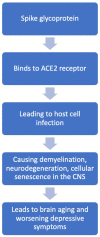The Relationship Between COVID-19 and the Development of Depression: Implications on Mental Health
- PMID: 37608908
- PMCID: PMC10441207
- DOI: 10.1177/26331055231191513
The Relationship Between COVID-19 and the Development of Depression: Implications on Mental Health
Abstract
Initially, Severe Acute Respiratory Syndrome Coronavirus 2 (SARS-CoV-2), the virus responsible for coronavirus disease-2019 (COVID-19), was predominantly considered to primarily affect the respiratory system. However, later studies revealed that it also affects brain function through its ability to bind to the angiotensin-converting enzyme type 2 (ACE2) receptors expressed on neural cells. Our study involved a comprehensive review of literature aiming to investigate the relationship between COVID-19 and the development of depression. Our analysis shows a connection between these 2 conditions, as a consequence of the inflammatory response in the nervous system to the COVID-19 virus and the psychophysiological effects of the pandemic. In COVID-19 patients, depression can arise either due to the direct viral infection of the brain or as a result of an indirect immune response triggering neuroinflammation after a cytokine storm. The resulting depression can be treated with non-pharmacological therapies such as psychotherapy, antidepressant medications, or a combination of these treatments depending on the severity of the symptoms.
Keywords: COVID-19; Depression; antidepressants; cytokine storm; neuroinflammation.
© The Author(s) 2023.
Conflict of interest statement
The author(s) declared no potential conflicts of interest with respect to the research, authorship, and/or publication of this article.
Figures
Similar articles
-
Possible mechanism of central nervous system targeting and neurological symptoms of the new-coronavirus (COVID-19): literature review.Eur Rev Med Pharmacol Sci. 2023 Oct;27(19):9420-9428. doi: 10.26355/eurrev_202310_33970. Eur Rev Med Pharmacol Sci. 2023. PMID: 37843354 Review.
-
Angiotensin-converting enzyme 2 (ACE2), SARS-CoV-2 and the pathophysiology of coronavirus disease 2019 (COVID-19).J Pathol. 2020 Jul;251(3):228-248. doi: 10.1002/path.5471. Epub 2020 Jun 10. J Pathol. 2020. PMID: 32418199 Free PMC article. Review.
-
Harnessing the immune system to overcome cytokine storm and reduce viral load in COVID-19: a review of the phases of illness and therapeutic agents.Virol J. 2020 Oct 15;17(1):154. doi: 10.1186/s12985-020-01415-w. Virol J. 2020. PMID: 33059711 Free PMC article. Review.
-
An update on angiotensin-converting enzyme 2 structure/functions, polymorphism, and duplicitous nature in the pathophysiology of coronavirus disease 2019: Implications for vascular and coagulation disease associated with severe acute respiratory syndrome coronavirus infection.Front Microbiol. 2022 Nov 28;13:1042200. doi: 10.3389/fmicb.2022.1042200. eCollection 2022. Front Microbiol. 2022. PMID: 36519165 Free PMC article. Review.
-
Immunological Aspects of SARS-CoV-2 Infection and the Putative Beneficial Role of Vitamin-D.Int J Mol Sci. 2021 May 16;22(10):5251. doi: 10.3390/ijms22105251. Int J Mol Sci. 2021. PMID: 34065735 Free PMC article. Review.
Cited by
-
Depression, Anxiety, and Neuropsychiatric Symptom Burden in a Longitudinal Cohort with Persistent Psychophysical Post-COVID Olfactory Dysfunction.Brain Sci. 2024 Dec 19;14(12):1277. doi: 10.3390/brainsci14121277. Brain Sci. 2024. PMID: 39766476 Free PMC article.
-
Repeated Sulforaphane Treatment Reverses Depressive-like Behavior and Exerts Antioxidant Effects in the Olfactory Bulbectomy Model in Mice.Pharmaceuticals (Basel). 2024 Jun 11;17(6):762. doi: 10.3390/ph17060762. Pharmaceuticals (Basel). 2024. PMID: 38931429 Free PMC article.
-
Case report: Development of anxiety symptoms after receiving the Pfizer-BioNTech (BNT162b2) COVID-19 vaccine: a case series.Front Psychiatry. 2025 Jan 22;15:1514428. doi: 10.3389/fpsyt.2024.1514428. eCollection 2024. Front Psychiatry. 2025. PMID: 39911555 Free PMC article.
-
Neuropsychiatric Manifestations of Long COVID-19: A Narrative Review of Clinical Aspects and Therapeutic Approaches.Life (Basel). 2025 Mar 11;15(3):439. doi: 10.3390/life15030439. Life (Basel). 2025. PMID: 40141784 Free PMC article. Review.
-
Leading Causes of US Deaths in the 2022.J Clin Med. 2024 Nov 23;13(23):7088. doi: 10.3390/jcm13237088. J Clin Med. 2024. PMID: 39685544 Free PMC article.
References
-
- De Rosa MA, Calisi D, Carrarini C, et al.. Olfactory dysfunction as a predictor of the future development of Parkinsonism in COVID-19 patients: a 18-FDOPA PET study. Eur J Neurodegener Dis. 2023;12:S480.
Publication types
LinkOut - more resources
Full Text Sources
Miscellaneous




